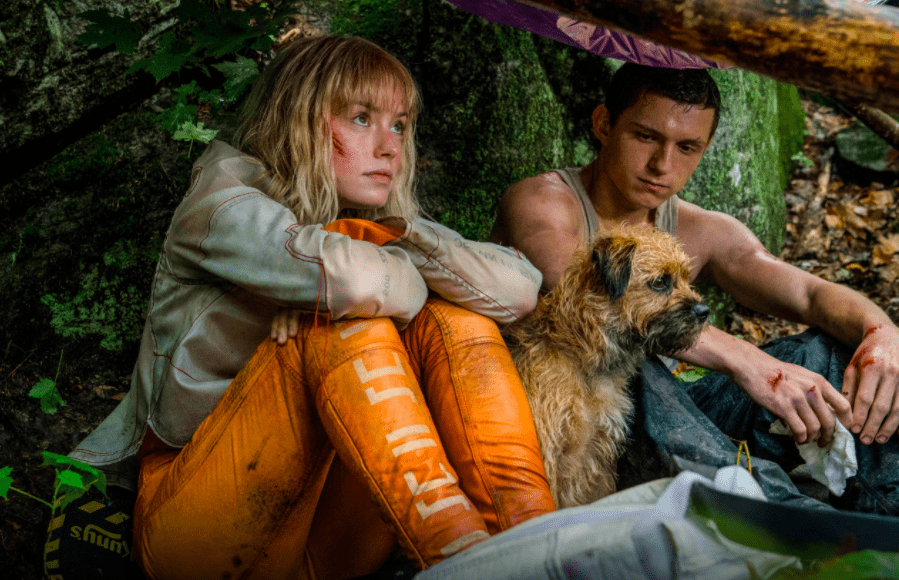
Written by Sam Niles
Seeing the trailer for the much-delayed Chaos Walking, those unfamiliar with Patrick Ness’s original novels may have thought the concept for the sci-fi adaptation seemed absurd. The idea that men’s thoughts are projected for all to hear (called “noise” in the film), likely seemed to fit the two-year negative hype about the “unreleasable” film for many. However, those particular concerns are unfounded, and the way the film incorporates the concept is far and away the high point, serving as an effective exploration of characterization, world building, and, sometimes, tension.
Unfortunately, while the concept may be commended, much of the film surrounding it is left wanting.
To focus on the positive, on a planet where you see the internal monologue of 90% of the characters, new opportunities for characterization arise. This happens primarily through Todd (Tom Holland), a younger, immature character. We see Todd trying (and failing) to control his “noise” as early as the opening scene, where he desperately tries to smother his trash talk as the evil, misogynist priest (David Oyelowo) walks by.
Characters like the priest and the mayor (Mads Mikkelsen, who spends much of his screentime in a rather dapper hat) serve as interesting contrasts to Todd. The priest embraces his horrific, hateful rage with no issue that people can know every thought in his head, oftentimes manifesting images of flames amidst his loathsome ranting. His expression is as sloppy as the young Todd, testament to the blindness of his rage and more importantly, he likes the slop.
The Mayor, on the other hand, lets you know only the thoughts he wants you to know, and it’s a testament to his self control, his mastery of the noise. He’s clever, imaginative and has an understanding of every inch of space and every single person around him. In a scene when Viola (Daisy Ridley) arrives on the planet and tries to escape the men pursuing her, a massive fence suddenly surrounds her. Rather than being some “real” trap the settlers created, it’s instead a visual deception from the Mayor’s noise, and he breaks through the foggy haze of his imagined fence as he attempts to calm her. Mikkelsen’s calm, charismatic and potentially untrustworthy demeanor, which he handled so brilliantly in Hannibal, fits this character like a glove.
The conceptual cleverness goes beyond the male characters—at least for a time. When Viola is first confronted with this new … development, she doesn’t say a word for a little while, but her face says it all: “I need to get out of here.” However, for all the praises I wish I could continue to sing for the concept, these positive elements only go so far.
The action scenes, for instance, aren’t awful, but they do the film few favors. Because the action sequences primarily consist of chase scenes, it’s difficult to to grasp onto anything concrete. We get shaky shots of someone running, the camera panning from left to right or right to left as men on horses run by. (Not to mention the embarrassing green screen work showing close-ups of Viola on a motorcycle and a horsebound Todd). A river-based fight scene just seems to cut back and forth between shaky medium shots of the actors and throws in an occasional “dynamic” wider shot that flies above the characters. Intended to add energy, they instead do…nothing.
The action isn’t incoherent or disorienting, but it is aimless and un-impactful, which unfortunately also describes much of the script. There’s a twist that pertains to the settlement and to Todd’s history, and while I immediately guessed this twist, it also furthered my understanding of a character. So, the predictability didn’t matter. It’s once the other characters figure it out that it doesn’t land. Todd acknowledges it in a quasi-emotional way–Viola comforts him–but that’s it. When it’s discussed with other characters, it feels as though they were shot through pick-ups on a weekend the actors were free.
Another moment that feels similar in its tragic waste of dramatic opportunity is about Viola’s parents. Todd asks about them, and her uncomfortable silence is doubly uncomfortable to him. Her eventual revelation that they’re dead could have been a cathartic moment of trust, but it instead comes across as “alright Daisy, here’s your dialogue, just say it so we can get a move on.”
This is the primary issue with Chaos Walking. It has plenty of strong, inspired elements that work so well, and many elements that could work so well. But in the end, too much of the result is too half-hearted to appreciate this as anything more than wasted potential.
Chaos Walking is based on the first of a trilogy of books. Perhaps the books are good. Perhaps they embrace the potential of the concept more fully. Perhaps the original cut of the movie was actually a misunderstood masterpiece and a #ReleaseTheLimanCut movement will form. There are a lot of questions and possibilities. But as for the movie that we got, it is, with certainty, a missed opportunity.

